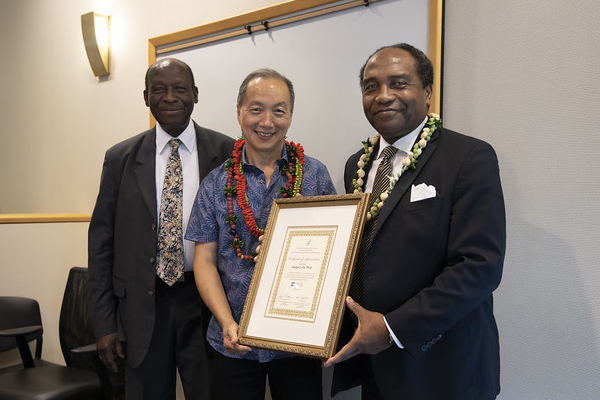
The Director of NIDDK honors program leader Dr. George Hui for opening doors, breaking glass ceilings and providing a path to biomedical research and better health in the communities.
A University of Hawaiʻi at Mānoa program offering science training to young people in Hawaiʻi and the Pacific has been so successful that top federal officials for the STEP-UP — or Short-Term Research Experience for Underrepresented Persons — program came here this month to recognize Dr. George Hui of the John A. Burns School of Medicine (JABSOM).
Dr. Hui began the program in 2002 at JABSOM initially as a contractor to the STEP-UP Principal Investigator at the Charles Drew University of Medicine and Science in Los Angeles, California. In 2003, he competed successfully for a grant from the National Institute of Diabetes and Digestive and Kidney Diseases (NIDDK) of the National Institutes of Health (NIH) as Principal Investigator to establish the STEP-UP program at JABSOM, and to recruit high school students in Hawaiʻi, Alaska, and Puerto Rico to the program. He joined two principal investigators who were recruiting high school students from other states into the national STEP-UP program. As in the national STEP UP, his program paired students with scientist mentors for summer research projects.
Dr. Griffin Rodgers, director of the NIDDK, recalls the late U.S. Senator Daniel Inouye of Hawaiʻi calling him aside at a Senate Appropriations Committee hearing on Capitol Hill to discuss the STEP-UP program with him.
Inouye told Dr. Rodgers he had learned about a “fantastic program for high school students that had been doing great work throughout the country for the past five years” and asked if those efforts might be expanded to other islands in the Pacific.
The NIDDK, which provides the funds for the national STEP-UP, provided additional funds to Dr. Hui to expand the program to other Pacific Islands, to include American Samoa, Guam, the Commonwealth of the Northern Mariana Islands, the Federated States of Micronesia, the Republic of the Marshall Islands, and the Republic of Palau. Dr. Hui renamed his program the Pacific STEP-UP.
“With George at the helm, not only has Pacific STEP-UP opened doors and broken glass ceilings, it’s created throughout the Pacific territories a path to biomedical research, one which can help improve public health, extend life, and eliminate disabilities in a way that is so important to the local communities,” Dr. Rodgers said in a ceremony at JABSOM in which he presented a certificate to Dr. Hui. The certificate recognized Dr. Hui’s dedication to fostering diversity among future generations of biomedical research scientists.
Rodgers wasn’t overstating Dr. Hui’s success.
Pacific STEP-UP has had 352 participants between 2002-2018. Nearly 80% of them have gone on to college, and 73.6% of those, or 140 students, have since earned four-year degrees in science. Almost 30% of them have or are pursuing post-baccalaureate degrees in science and health disciplines. Ninety-nine of the science graduates are women — a sign, Dr. Rodgers said, that diversity and inclusion are very important to Dr. Hui.
Dr. Hui, a malaria vaccine researcher in the Department of Tropical Medicine, Medical Microbiology and Pharmacology, seemed unlikely to launch such an expansive program. Self-described as a quiet person, he trained as a microbiologist and studied the use of different vaccines for malaria. But the calling he felt when he witnessed bright minds in educational settings lacking the kinds of challenges that medical school could offer inspired him to expand his career beyond his own laboratory. On one personal trip that Dr. Hui and his wife took to Molokaʻi, he saw first-hand that even in his home state, access to high-level researchers and their tools can be limited.
Current JABSOM medical student Ken Stridiron applied to PACIFIC STEP-UP while a student at Kapolei High School. “STEP-UP opened a lot of opportunities for me in the STEM (Science, Technology Engineering and Medicine) field, gave me experience in research and giving presentations and then sent me all the way to the NIH itself to meet like-minded students from all across the nation who had similar aspirations but were in similar disadvantaged backgrounds like myself. And from there it just continued to give,” he said.
When Stridiron went on a four-week MD student rotation to American Samoa recently, he volunteered to speak to some of the STEP-UP students there. “I hope that I can continue to give back to STEP-UP the way that they gave to me,” said Stridiron.
In addition to the NIDDK, staff members from U.S. Representative Ed Case’s office attended the ceremony to personally present a congratulatory certificate to Dr. Hui, and a signed proclamation was presented from U.S. Senator Brian Schatz’s office.
Dr. Hui deflected the praise, saying it should all go to the Pacific STEP-UP program itself, and to many at JABSOM who “walked these Pacific Islands” before he did, “giving JABSOM a good name.” He named physician/researchers Dr. Neal Palafox, Dr. Marjorie Mau, Dr. Greg Dever, and the former Vice Dean, Dr. Satoru Izutsu.
“There is a door sign out in the lab in American Samoa and every one of the Pacific places that has ‘NIDDK’ and then ‘UH Medical School’ (on it),” said Dr. Hui. “That sign is going to outlast me. I’m just grateful that the program started here at the medical school and I’m really grateful that my Dean (and) my Chair (have) always supported and kept my head above water, and I hope that STEP-UP would continue with or without me,” he said.
Learn more about Pacific STEP-UP and how to apply at https://stepup.jabsom.hawaii.edu/